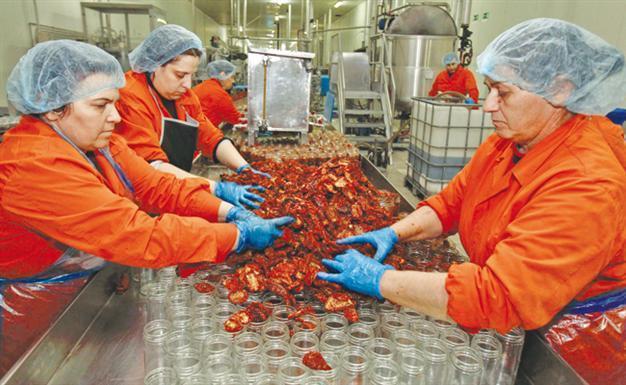‘Made in Greece,’ a magical label: Survey
ATHENS

Workers put sun-dried tomatoes in jars at a food company in the central Greek town of Agrinio. Greeks are increasingly using domestic products, a survey says.
At least one third of Greeks are sensitive about consuming domestic goods, in a move they define as part of a “patriotic” attitude, according to a recent study jointly conducted by Athens Economy University and Western Greece University.Many consumers participating in the survey said they were bought domestic goods despite the fact they were more expensive, thinking this would support the local economy and help cut the country’s unemployment rate. Some 13 percent of participants said they were driven to buy domestic goods in the last six months. The rate goes up to 23 percent for the last one year.
The “Made in Greece” label has a magical effect, according to data from a survey conducted by Anatolia news agency. Domestic diary products, fruits and vegetables received the highest interest with 91 percent, as floured products, beverages, alcoholic drinks, processed and frozen food followed.
Greece will try to raise 3.125 billion euros ($3.8 billion) in an auction of three-month treasury bills this week to try and avoid a looming cash crunch, a finance ministry official has said.
“This is to cover the country’s current needs and avoid finding ourselves in a dead-end,” the official said, according to Agence France-Presse, as the government finds itself in great need of cash to pay salaries and pensions it faces redeeming a 3.2-billion-euro bond held by the European Central Bank on Aug. 20.
While Greece has been shut out of the long-term debt markets since 2010, it has regularly issued short-term debt, although the Aug. 14 auction dwarfs previous placements.
Greece raised 812.5 million euros last week in an auction of six-month treasury bills, paying a slightly lower rate of 4.68 percent.
In its last three-month treasury bill sale, on July 17, Greece raised 1.625 billion euros at a slightly lower rate of 4.28 percent. EU-IMF bailout loans are supposed to keep the government solvent, but a two-month political deadlock after back-to-back elections in May and June put its reform program off track.
















